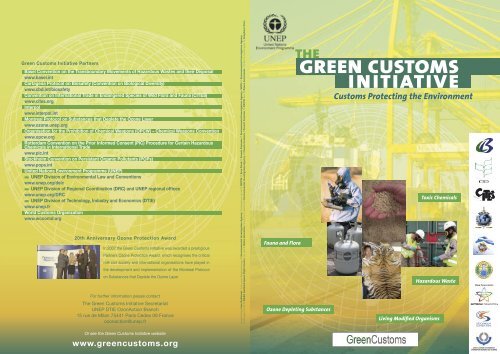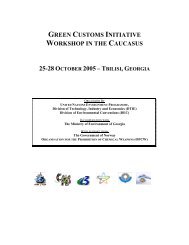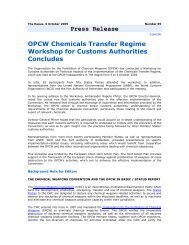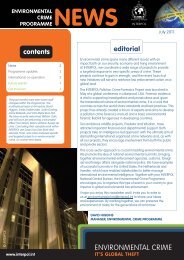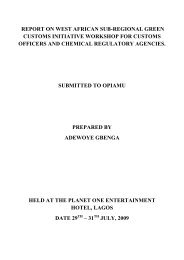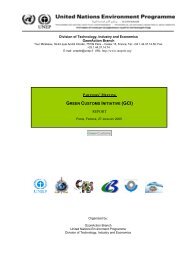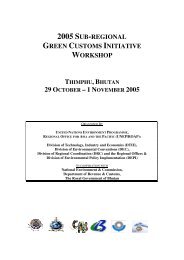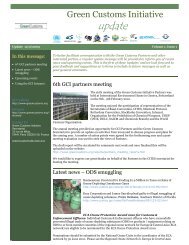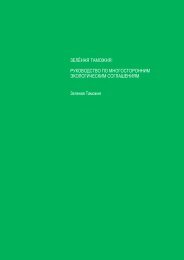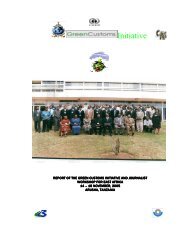Flyer - Green Customs Initiative
Flyer - Green Customs Initiative
Flyer - Green Customs Initiative
- No tags were found...
Create successful ePaper yourself
Turn your PDF publications into a flip-book with our unique Google optimized e-Paper software.
<strong>Green</strong> <strong>Customs</strong> <strong>Initiative</strong> PartnersBasel Convention on the Transboundary Movements of Hazardous Wastes and their Disposalwww.basel.intCartagena Protocol on Biosafety (Convention on Biological Diversity)www.cbd.int/biosafetyConvention on International Trade in Endangered Species of Wild Flora and Fauna (CITES)www.cites.orgInterpolwww.interpol.intMontreal Protocol on Substances that Deplete the Ozone Layerwww.ozone.unep.orgOrganisation for the Prohibition of Chemical Weapons (OPCW) – Chemical Weapons Conventionwww.opcw.orgRotterdam Convention on the Prior Informed Consent (PIC) Procedure for Certain HazardousChemicals in International Tradewww.pic.intStockholm Convention on Persistent Organic Pollutants (POPs)www.pops.intUnited Nations Environment Programme (UNEP)■ UNEP Division of Environmental Law and Conventionswww.unep.org/delc■ UNEP Division of Regional Coordination (DRC) and UNEP regional officeswww.unep.org/DRC■ UNEP Division of Technology, Industry and Economics (DTIE)www.unep.frWorld <strong>Customs</strong> Organizationwww.wcoomd.org20th Anniversary Ozone Protection AwardIn 2007 the <strong>Green</strong> <strong>Customs</strong> <strong>Initiative</strong> was awarded a prestigiousPartners Ozone Protection Award, which recognises the criticalrole civil society and international organisations have played inthe development and implementation of the Montreal Protocolon Substances that Deplete the Ozone LayerFor further information please contactThe <strong>Green</strong> <strong>Customs</strong> <strong>Initiative</strong> SecretariatUNEP DTIE OzonAction Branch15 rue de Milan 75441 Paris Cedex 09 Franceozonaction@unep.frGraphic Design Line Guillemot - Front cover Background image: © Environmental Investigation Agency. Clockwise from top left: © OPCW, © Ezra Clark, © French <strong>Customs</strong>, © Environmental Investigation Agency /WPSI, © Environmental Investigation Agency.Inside pages, top left: © NASA Goddard Space Flight Center, top right: © Robin Hamilton. Centre (top to bottom): © Environmental Investigation Agency, © French <strong>Customs</strong>, ©French <strong>Customs</strong>, © OPCW. Back © Ozone Secretariat.- Printed on recycled paper by Graphitec ParisTHEGREEN CUSTOMSINITIATIVE<strong>Customs</strong> Protecting the EnvironmentToxic ChemicalsFauna and FloraHazardous WasteOzone Depleting SubstancesLiving Modified OrganismsOr see the <strong>Green</strong> <strong>Customs</strong> <strong>Initiative</strong> websitewww.greencustoms.org
^Answering the callUNEP’s Governing Council expressed concern over the increasing environmental damage causedby illegal traffic in endangered species and dangerous and harmful substances and products. It alsorecognised that continuous efforts must be undertaken by all countries and relevant organisationsand agencies concerned with ensuring compliance and enforcement of relevant internationalagreements. The <strong>Green</strong> <strong>Customs</strong> <strong>Initiative</strong> is a partnership actively addressing these concerns.Council Decision 21/27 on Compliance with and enforcement of multilateral environment agreements, February 2001^GREENCNINITIATIVECUSTOMS^Environmental Crime – a growing problemEnvironmental crime is a significant and increasingly lucrative business. National and internationalcrime syndicates worldwide earn an estimated US$ 20-30 billion dollars annually from hazardouswaste dumping, smuggling proscribed hazardous materials, and exploiting and trafficking protectedHEnatural resources. Illegal international trade in “environmentally-sensitive” commodities such asozone depleting substances (ODS), toxic chemicals, hazardous wastes, endangered species andliving modified organisms is an international problem with serious consequences. It directly threatenshuman health and the environment; contributes to species loss; results in revenue loss forgovernments; and undermines the success of international environmental agreements bycircumventing agreed rules and procedures.The need for action<strong>Customs</strong> and border protection officers constitute the front line of every country's defence againsttrans-boundary illegal trade. They are the first link in the “compliance and enforcement chain”, andwithout adequate capacity to prevent or detect illegal trade, the rest of the chain will be considerablyless effective. Building the capacity of these officers is therefore vital. Training is a key component ofcapacity building, but can be time-consuming and expensive when delivered separately for the widerange of issues customs officers must cover. An effective solution is coordinated training – and thisis where <strong>Green</strong> <strong>Customs</strong> comes in…Helping to address the problem - The <strong>Green</strong> <strong>Customs</strong> <strong>Initiative</strong>The <strong>Green</strong> <strong>Customs</strong> <strong>Initiative</strong> is an unprecedented partnership of international organisationscooperating to prevent the illegal trade in environmentally-sensitive commodities and facilitation of thelegal trade in these. Its objective is to enhance the capacity of customs and other relevantenforcement personnel to monitor and facilitate the legal trade and to detect and prevent illegal tradein environmentally-sensitive commodities covered by the relevant conventions and multilateralenvironmental agreements (MEAs). These include: ODS; toxic chemical products; hazardous wastes;fauna and flora; and living modified organisms. This is achieved through awareness-raising on all therelevant international agreements as well as provision of assistance and tools to the enforcementcommunity. <strong>Green</strong> <strong>Customs</strong> is designed to complement and enhance existing customs training effortsunder the respective agreements.<strong>Green</strong> <strong>Customs</strong> PartnersThe partners of the <strong>Green</strong> <strong>Customs</strong> <strong>Initiative</strong> comprise the secretariats of the relevant multilateralCUSTOMS^environmental agreements (Basel, Cartagena, CITES, Montreal, Rotterdam and Stockholm - see overfor full descriptions), Interpol, the Organisation for the Prohibition of Chemical Weapons, UNEP and theWorld <strong>Customs</strong> Organization. The <strong>Green</strong> <strong>Customs</strong> <strong>Initiative</strong> also works closely with a number of otherregional and international organisations.Benefits of <strong>Green</strong> <strong>Customs</strong>For <strong>Customs</strong> Officers^ Increased knowledge about environmental issues, particularly those related to MEAs^ Enhanced skills required to enforce national environmental commitments^ Better recognition of the role of customs officers in environmental protectionFor Countries^ Increased detection of smugglers and illegally-traded commodities by national customs officers,and facilitation of legal trade^ Strengthened capacity for national compliance and enforcement of MEAs through monitoring of trade^ Increased opportunity for dialogue with regional trade partner countries on illegal trade issues^ Sustained capacity building through integration of <strong>Green</strong> <strong>Customs</strong> into national customs trainingcurricula^ Prevention of loss of revenue from tax and duty avoidance associated with smuggling^ Increased integration of environment into the security agendaFor Partners^ Increased opportunity for synergies in implementation between MEAs^ Shared training infrastructure and experience developed by the SecretariatsFor the Global Environment^ Decrease in environmental crime and other environment-related offences, control of toxic chemicalsand waste, better species protection, leading to a less polluted and more sustainable environment<strong>Green</strong> <strong>Customs</strong> Tools<strong>Green</strong> <strong>Customs</strong> GuideA guide for trainees and trainers to be used as a core element during the training coursesand as a post-course reference documentWorkshops to train customs officersMany <strong>Green</strong> <strong>Customs</strong> training workshops have been held all around the world. These have rangedfrom regional workshops to sub-regional and national workshops.<strong>Green</strong> <strong>Customs</strong> website and materialsInformation and more details on the <strong>Green</strong> <strong>Customs</strong> <strong>Initiative</strong> can be found on the <strong>Green</strong> <strong>Customs</strong>website: www.greencustoms.org


